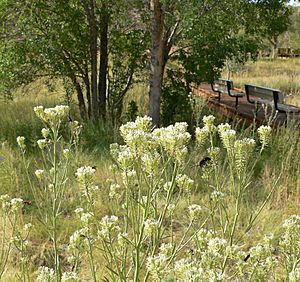Entireleaved thelypody facts for kids
Quick facts for kids Entireleaved thelypody |
|
|---|---|
 |
|
| Thelypodium integrifolium subsp. affine | |
| Scientific classification | |
| Genus: |
Thelypodium
|
| Species: |
integrifolium
|
Thelypodium integrifolium is a type of flowering plant. It belongs to the mustard family. People often call it the entireleaved thelypody or foxtail thelypodium. You can find this plant growing in many parts of the western United States. This includes the large Great Basin area and the plateaus and deserts around it.
This plant grows in different kinds of places. It often likes sandy soils that have lots of minerals. It also grows well in alkaline soils, which are a bit salty. You might see it in dry lake beds, also known as playas.
About the Thelypodium Plant
Thelypodium integrifolium is a plant that lives for two years. This means it grows leaves and stems in its first year. Then, in its second year, it flowers, makes seeds, and dies. Its stem is smooth and waxy. It has a strong, thick base. The stem can grow straight up or branch out near the top. Some of these plants can get very tall, almost three meters high!
The leaves of this plant are also thick and waxy. They are not divided into smaller leaflets. Their edges are smooth. The biggest leaves grow near the bottom of the plant. These can be longer than 30 centimeters. Leaves higher up on the stem are shorter. Their edges can be smooth or slightly toothed.
Flowers and Fruits
The flowers of Thelypodium integrifolium grow in a tight, cylinder-shaped cluster. This cluster looks like a spike. It is called a raceme. The flowers can be white or a pretty purplish color. After the flowers bloom, the plant makes long, thin fruits. These fruits are called siliques. Each silique can grow up to 8 centimeters long.
Different Kinds of Thelypodium integrifolium
There are five main types, or subspecies, of Thelypodium integrifolium. Each one has slightly different features or grows in different places.
- T. i. ssp. affine: This type has white petals. You can find it in the Mojave Desert in California and also in the Great Basin.
- T. i. ssp. complanatum: This subspecies mostly grows in the Great Basin. Its flowers usually have lavender (light purple) petals.
- T. i. ssp. gracilipes: This type is found in the Four Corners region. This is where the states of Arizona, Colorado, New Mexico, and Utah meet.
- T. i. ssp. integrifolium: This subspecies is very common. It grows widely in the northern parts of where the plant is found.
- T. i. ssp. longicarpum: This type is special because it only grows in Arizona. It has only been found near the Grand Canyon.

